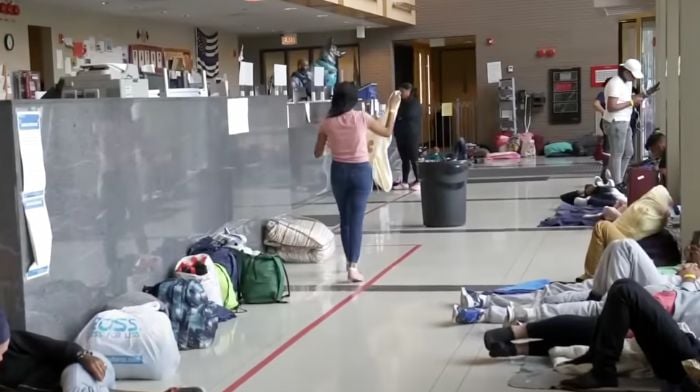By Andrew Hensel (The Center Square)
As more non-citizens are set to arrive in Chicago in the coming days, they’ll be greeted with tents. Questions surrounding how the city will afford to pay for the influx of non-citizens persist as other large cities have announced budget cuts.
About 14,000 migrants have arrived in Chicago over the past year. NBC Chicago reported that five more buses of migrants are on their way. Chicago is a sanctuary city where enforcement of federal immigration laws is relaxed.
New York City, the largest city in the United States and also a sanctuary city, has seen migrants arrive in the tens of thousands. New York Mayor Eric Adams recently released a statement announcing that they would have to make budgetary changes to afford caring for the migrants.
“Coupling the costs of a national crisis that has fallen onto New York City with COVID funding that is running out and reduced revenue growth, our city’s financial future may be at risk if we do not act,” Adams said. “Our city continues to receive approximately 10,000 asylum seekers each month, and, as we laid out last month, we anticipate spending $12 billion through the end of Fiscal Year 2025 if circumstances do not change.”
Related: Chicago TV News Crew Robbed At Gunpoint During Segment On Robberies In The City
Chicago is expected to spend over $250 million on migrants this year alone. With Windy City finances tight, Mayor Brandon Johnson Friday was asked about the upcoming budget conversations.
“I believe that it is important that everything is on the table, that’s my position,” Johnson said during a forum with the Economic Club of Chicago. “As far as how I am thinking about it, it really is about making sure the priorities that we set position us to grow our economy in the budgets to come.”
So far, Chicago and Illinois taxpayers have set aside $94 million for migrant housing. The state budget has $550 million in taxpayer subsidies for the health care of migrants over the age of 65.
The arrivals have been housed throughout the city, mostly in police stations, while also occupying old YMCA buildings, colleges and even the airport. Recently, Johnson said the city is looking at other towns in the suburbs to help with housing migrants. Friday, Alderman Andre Vasquez said Johnson briefed the city council on a new plan to house the migrants.
“Earlier today, the City Council was briefed on the Mayor’s plan to establish military grade tent basecamps in order to decompress police stations, whose floors are where over 1,500 asylum seekers will be sleeping tonight, as they have for months,” Vasquez said.
Related: Study: Half of All Chicagoans Will Witness a Shooting by Age 40
Johnson late last month said they will not be able to keep taking care of the migrants without significant help from the federal government.
“Let me state this clearly, the city of Chicago can not go on welcoming new arrivals safely and capably without significant support and immigration policy changes,” Johnson said.
Adams also urged the state and federal government for assistance.
“We need Washington and Albany to finally do their part by paying their fair share and coming up with a decompression strategy that reduces the pressure on New York City, so we are not forced to manage this crisis almost entirely on our own,” Adams said.
Many of the migrants have traveled from Texas, after Texas Gov. Greg Abbott began transporting migrants to Chicago, New York and Washington, D.C., in response to President Joe Biden’s immigration policies that have resulted in a surge of illegal border crossings beginning in August of 2022.
Syndicated with permission from The Center Square.


